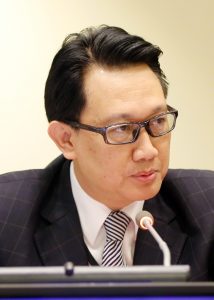Venue
Start
End
Time
Speaker(s)/Moderator(s)
Downloads
Indonesian Ocean Policy by Ambassador Arif Havas Oegroseno
Introduction
Indonesia is the largest archipelagic state in the world, and its destiny is linked to its ocean. The nation has 6 million square kilometres of sea area, which covers its 17 thousand more islands. Indonesia was also an active player during the establishment of the United Nations Convention on the Law of the Sea (UNCLOS), particularly regarding the concept of archipelagic state.
Indonesia, as a nation of the sea, is fully committed to carry out its obligation as an archipelagic state under UNCLOS 1982. Yet, for many years, the nation lacked a coherent and comprehensive ocean policy. During the new order regime, most of the nation’s development strategies were characterised by continental approaches.
The continental approach and the lack of ocean-based strategies have led Indonesia’s policy into wrong paths. For years, wrong policy has created poor interisland connectivity leading to unequal development at the outermost parts of the nation. The lack of a coherent sea policy has also sacrificed the nation’s ocean economy, weakened its border control management and law enforcement at sea, and made its maritime power projection inferior in relation to its majestic economic size and strategic position in global geopolitics.
Therefore, the establishment of Indonesian Ocean Policy by President Jokowi is seen as an important step for Indonesia in realising the nation’s aspiration to be a global maritime powerhouse. As a national document launched under the authority of executive power, the document will serve as national guidelines in implementing Indonesian policy on the ocean.
The document embodies a major narrative to develop Indonesia from its ocean. It is founded upon 6 principles, 7 policy pillars and 76 strategic policies ranging from marine and human resources strategy, maritime security policies, ocean governance matters, maritime economy paths and maritime diplomacy strategies. It is an integrated, comprehensive and coherent document that contains strategic vision, measurable policy outcomes and a concrete timeline.
Aside from its domestic use, the document is also seen by many as a strategic document that projects Indonesia’s interest and adaptive strategy to adapt to and counteract strategies of various key players in the region. As Indonesia is the largest economy in Southeast Asia and the largest country in the region, it is crucial to observe and examine how this major narrative and strategic document will interact with and affect Indonesian and regional geopolitics.
Speaker

Ambassador Arif Havas Oegroseno
Ambassador Arif Havas Oegroseno is currently Deputy Coordinating Minister for Maritime Sovereignty Affairs at the Coordinating Ministry for Maritime Affairs, Republic of Indonesia. He was the President of the 20th Meeting of State Parties to the United Nations Convention on the Law of the Sea, the Director-General for Law and International Treatise (Legal Advisor) of the Ministry of Foreign Affairs, and Indonesian Ambassador to Belgium, Luxembourg, and the European Union from 2010 to 2015.
During his time as legal advisor to the Ministry of Foreign Affairs, he led negotiations for numerous bilateral and regional negotiations, including Indonesian maritime boundaries, mutual legal assistance in criminal matters, and extradition negotiations. He led the landmark negotiation of Indonesia-Australia Security Framework Agreement, which has been ratified by both Indonesian and Australian parliaments. He was also the Indonesian High Level Legal Expert of the ASEAN Charter, assigned with other ASEAN High Level Legal Experts to conclude the ASEAN Dispute Settlement Mechanisms.
Apart from his professional life as a diplomat and technocrat, Amb Oegroseno also actively participates as a speaker and panellist in international conferences on the law of the sea and other ocean-related issues. He gives lectures at various distinguished academic institutions such as Rhodes Academy, International Maritime Law Institute, Centre for Ocean Laws and Policy at the University of Virginia, Centre for International Law at the National University of Singapore, Cambridge University, and the London School of Economics. He also writes on numerous international issues in academic journals and newspapers.
In his current position, Amb Oegroseno is a key figure in the development of Indonesian Ocean Policy. He personally provides inputs and oversees the development of the document.

